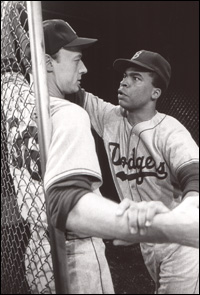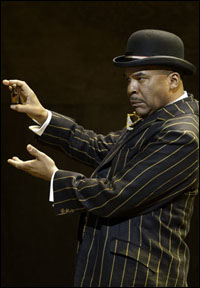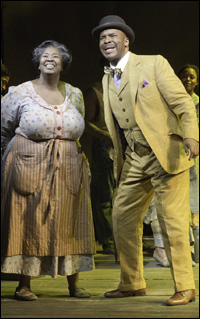
*
Straight out of Yale Drama School — and first in line to audition for The First — he Broadway-bowed as the man who broke the baseball color line in 1947, Jackie Robinson. Now, in The Gershwins' Porgy and Bess, he's in his jovial-menace mode as the light-footed low-life who hustles drugs, sex and so forth to the dirt-poor denizens of South Carolina's Catfish Row. That macho magic he makes moving from stage left to stage right is a little something he picked up from the pimps and pushers he observed in his Detroit boyhood and simply converted to music.
Both musicals earned him Tony nominations, but he didn't even have to tune up for his third Tony bid — a straight dramatic part in David Mamet's Race where he played the black lawyer locking horns with his white law-partner (James Spader).
In his other two jobs on Broadway, he stepped into roles that won Tonys for Cleavant Derricks (Dreamgirls) and Nathan Lane (A Funny Thing Happened on the Way to the Forum).
Most of his career has been spent on the West Coast in sketch-comedy television and in the features as second-banana to Eddie Murphy and Damon Wayans. He also developed considerable dramatic chops out there, but he gets to wear both theatrical masks as Sporting Life. He counts Porgy and Bess as a happy homecoming. There's a movie before the cameras now called "42." Do you know what that's about?
David Alan Grier: I have no idea. What's it about?
Jackie Robinson. Chadwick Boseman is playing him. Harrison Ford is Branch Rickey, Christopher Meloni is Leo Durocher, Lucas Black is Pee Wee Reese, John C. McGinley is Red Barber — it's a great cast. DAG: Ahhh — of course, "42" was his number! You know, I still have two jerseys from The First. I was able to get them about 20 years ago. They were in storage and going to be auctioned, and someone from The First called me and said, "Would you like something?" I took the Kansas City Monarchs jersey, the Brooklyn Dodgers jersey and this great suit that this tailor, Vincent, made. That was the longest fitting in my life — like three and a half hours, but the suit's beautiful. It used to fit me.
| |
 |
|
| Grier (right) with Court Miller in The First. | ||
| photo by Martha Swpoe |
DAG: Uh-huh. I think the last time I saw her they created a commemorative stamp for Jackie Robinson at the Brooklyn post office. I went and sang the title song from The First at the ceremony. She was very nice — a wonderful woman.
What was it like to play Jackie Robinson?
DAG: It was amazing. My memory of Jackie Robinson is nil. I was actually too young to experience that time. In doing my research, I realized The First wasn't just about Jackie Robinson. It was also so much about Brooklyn and New York — this time in New York City history when Ebbets Field was a gathering place for, really, the flavor of Brooklyn. Ebbets Field was beloved. Our curtain was a replica of the back wall of Ebbets Field, and people who came to our show would start crying. A housing project was put up there when it was torn down, and they were still lamenting Ebbets Field, still lamenting the Dodgers leaving and going to Los Angeles.
You've done five roles on Broadway. You were a replacement twice [in Dreamgirls and A Funny Thing Happened on the Way to the Forum], but the three roles you created on Broadway and were eligible for Tony consideration got you nominated. Three for three. How does that feel?
DAG: It feels great, especially at this point in my life. I started on Broadway, then went out to Los Angeles, did a lot out there in movies and television, and was finally able to come back to New York. The first thing I heard when I came back to do Race was "Welcome back!" from people I worked with 30 years ago. [Producer] Jeffrey Richards saw me in The First and was instrumental in me joining the production of The First. It's great to continue that relationship, humbling and amazing. To be able to come back to New York and do these roles has started a whole new phase of my career. Even after Race, I didn't expect to come back so soon to do anything. I have a young daughter, and I expected to go back to Los Angeles for a while. Then, Porgy and Bess materialized, and I knew I really wanted to be a part of it.
| |
 |
|
| Grier in The Gershwins' Porgy and Bess. | ||
| Photo by Michael J. Lutch |
DAG: I've been working, let's put it like that. I remember when The First opened, I thought, "This is easy!" I auditioned. It was my first professional job. I got a Tony nomination. I should have 20 nominations by now. And people at the time were, like, "Oh, you should treasure this time." They were right. You make decisions. Things have to be right. For the right production to come along that you are right for — that takes luck, preparation, providence. All of those things have to fall into place. It just so happened that Race came along, and then Porgy and Bess — one right after the other, and I've been able to participate in both. [It didn't hurt, of course, that Richards was lead producer of both of those shows.]
How do you feel about playing Sporting Life?
DAG: I love it. I've never seen the full opera, and, for me, that was helpful because I came with an open mind. I did not come with a preconceived notion of what this character was supposed to be. I'd read all about it — about the original production and what Gershwin's intentions were, about DuBose Heyward and his wife, Dorothy. I read the novel, "Porgy." I did all that work, but never having seen a production kind of allowed me to go and create something and be true to this production.
There's a hard edge in your Sporting Life.
DAG: The arc of the character that I'm trying to create starts like that, but at the bottom line he's a salesman. He's a drug dealer, and he's a pimp. At the end of the day, he purveys in flesh. He is preying on Bess so, when his opportunity comes, he pounces. He's like some people we all know: When you first meet them, they're attractive, they're flamboyant, they're alluring — but, behind closed doors, all of a sudden this side drops, and you're caught. That's exactly what happens here. He waits till she's at her weakest moment, and then that mask drops, and he preys on her. You have to show both sides, I think.
I love that moment when you're in striking distance and you freeze, like a bird-dog on point.
DAG: There are nights — emotionally, through that character — I feel like I'm going to kill her if she says the wrong thing. There are other nights when I feel like I'm in love with her. There are other nights when I despise Bess for not fighting more. The character takes me through all of those things — and, with Audra, she demands that. It's always searching, working, "let's try it a different way."
When I read that Audra McDonald was doing Bess, I knew I had to do this. We've never worked together, never even met. Of course, to my mind, she's a legend. She's Broadway royalty. I also knew I have to do it now. She'd never done Bess before, and this is the production I really wanted to be in. She's the reason I dropped everything and decided I'm going back. I sent [director] Diane Paulus an email that said, "I'd really love to be a part of this production,' and that really started the whole conversation.
| |
 |
|
| Grier and NaTasha Yvette Williams as Mariah in The Gershwins' Porgy and Bess. | ||
| photo by Michael J. Lutch |
DAG: I love the part — plus I get to sing Gershwin, too [cast-iron showstoppers like "It Ain't Necessarily So" and "There's a Boat That's Leaving Soon"].
I noticed Sporting Life is very skittish around Mariah, the matriarch of the community, who keeps shooing him away.
DAG: A lot of that was worked out in the process of rehearsal, trying to decipher what our relationships were. You know the talk that actors do: Do we know each other? It's a very small community, and, like any small community or neighborhood that you grew up in, you know who the mean guy is, you know who the nice lady is, you know the rich people who live two blocks away, the real poor people you give food to, the crazy lady, the family who lost a son in the war. Everybody knows everybody, and you just know each other's business.
I hear from a lot of people who come to Porgy and Bess how rich the ensemble-playing is. We spent a lot of time talking about how, in this community, you know each other's business. So they know me. I assume Sporting Life grew up in Catfish Row, left, turned into this person. He's That Guy, and he's coming back intermittently to pollute their community — sell drugs, sell women, sell bootleg liquor. That's what he does. People know him, and Mariah knows him better than any of them.
Do you mind playing sinister?
DAG: No. Every actor wants to play a bad guy. I remember Norm Lewis saying to me, "Oh, you'd be a great Porgy." And I'm, like, "Naw, I want to play Sporting Life." I love the songs he gets to sing. When we started unpeeling this opera, Suzan-Lori Parks, who adapted the book, and Diedre Murray, who adapted the music, were going, "We don't know what will be recitatives, what will be spoken or what will be sung," so we started learning all the recits….and then we started peeling it apart and discovering what works, dramatically. They were all so beautiful. You know, Gershwin is part of American Popular Song's DNA, so when you hear these musical themes, when you hear his musical ideas in each and every recit, it's like the history of American music.
I remember walking into a room where Phillip Boykin was at the piano and Diane and Diedre and Suzan-Lori Parks all had their eyes closed, with their hands over their hearts, smiling, and he's singing every recit, and I'm thinking, "This is an opera! I'm doing an opera!" Read the earlier Playbill Leading Men interview with Phillip Boykin, a 2012 Tony nominee for playing Crown.
Were your entrances and your exits choreographed?
DAG: No. I put that walk in, but Diane very much said, "The music is changing here. You've got to get from here all the way down center here. You make this entrance." She gave me the space to fill that time. It came about through the process, having to trust in them, [with me] saying, "It's only going to get bigger so you're going to have to tell me when to cut it off."
It's a slither, you know.
DAG: Yesssssss! Yesssssss!









